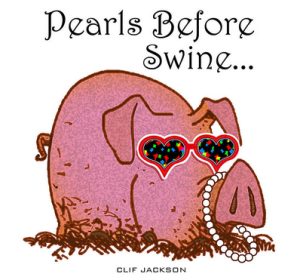Isn’t it great when you hear a sentence or a phrase that you love? Especially one you can use in some way that benefits you?
 Quotes often fit that category. So do Bible verses (more on that in a minute), and “sound bites” from interviews and speeches. “Ask not what your country can do for you, ask what you can do for your country.”
Quotes often fit that category. So do Bible verses (more on that in a minute), and “sound bites” from interviews and speeches. “Ask not what your country can do for you, ask what you can do for your country.”
The problem with many favorite phrases is that they are often taken out of context. Without their surrounding words they are misunderstood and misused.
Never mind that the speaker or writer didn’t mean what you seem to think they meant. Once you have been smitten by a phrase and repeated it many times, why would you bother to check?
Taking things out of context seems to be a customary practice for politicians. They do it to each other all the time. In less than ten minutes of searching online you can find Republicans taking the words of Democrats out of context and Democrats doing exactly the same thing to Republicans.
I use those political parties as illustrations, but the practice of taking the words of political opponents out of context can be found in virtually all times and around the world.
Perhaps you have been taken out of context by your spouse or by a parent or by one of your children. It’s always a tiny bit jarring when someone says, “You said….” and you respond, “Yes, but that is not what I meant.”
Taking God out of context
Having several friends who are what I call “professional Christians” is often useful for research purposes. So it was that I asked a couple of them, “Which Bible verse used out of context bugs you the most?”
In my very unscientific survey, there were several candidates. Coming in at Number 2 was “I can do all things through Christ who strengthens me.” This is a wonderful verse written by Paul to say, “I have learned to be content when I’m poor or when I have plenty of money.” How? The secret is to always depend on Christ, not money.
Is the principle true in other endeavors? Yes, but it does not mean you can you run a mile in 3 minutes or swim across the ocean.
 Taking the top spot, though, was a verse quoted by Christians and non-Christians alike. “Judge not, that you be not judged.” Jesus himself said that one, and it is almost always used without the benefit of its context.
Taking the top spot, though, was a verse quoted by Christians and non-Christians alike. “Judge not, that you be not judged.” Jesus himself said that one, and it is almost always used without the benefit of its context.
In fact just a few sentences later, Jesus says, “Don’t cast pearls before swine.” What are pearls? Who plays the part of the pigs? Isn’t some judgment implied in that statement?
But people insist on proclaiming that any kind of judgment — even assessment — of anyone else is wrong. And if you do it, they will pronounce you wrong at best and a hypocrite at worst. No judgment, of course.
My point is that even God is taken out of context quite often. That’s because we like to hear what we like to hear, and we like to say what we like to hear. Context, it turns out, can really be a bother.
Broader contexts
When one person kills another person, is it with “malice aforethought?” Is it accidental? Is it self-defense? The circumstances are vitally important if we are to treat people justly.
If you harmed someone because they were trying to harm you, you would probably want those circumstances known. When you see someone accused of something, find out — if you can — about the circumstances. They can make a huge difference in understanding what really happened.
In other words, what was the context?
Context is also important for actions that happened in another time but are judged (!) by some modern standard.
 Now if you are as smart as I think you are — and I hold you all in high regard — you will see where this is going. We are almost there.
Now if you are as smart as I think you are — and I hold you all in high regard — you will see where this is going. We are almost there.
In recent days people have worked, sometimes successfully, to get a book titled Adventure’s of Huckleberry Finn banned from schools. Written by Mark Twain and first published in 1885, it is often named as one of the greatest works in American literature. Far from supporting its ban, I highly recommend it for anyone willing to think.
But some modern critics say it is offensive. In the book is a racial epithet that cannot be spoken. You and I are quite free to curse God, to use God’s name any way we please in almost any context. We can drop “f-bombs” in grade schools, in movies, and certainly in music. There is one word, however, that cannot be uttered, and it is uttered often in The Adventures of Huckleberry Finn.
I am not advocating using the word, but when the book was written it was a common word in the vocabulary. Context.
Now we are There
What critics, going for the easy mark as they often do, fail to note is that Huck Finn treats Jim, a slave who was seeking freedom, as an equal. The racial epithet was normal — treating a runaway slave as an equal definitely was not.
The same critics who make these judgments also use, “Judge not that you be not judged” as if they know what it means. They take one thing out of context to support their own point of view. They follow that by taking another phrase out of context to keep from being criticized for their error.
Perhaps they do not see their mistake. I know that I have been blind to my failings at times. Thankfully I have people around me who see them clearly and are kind enough to point them out.
At least they tell me they are being kind.
Do not fall into the same trap that has ensnared so many. Always check the context. Examine it. Surrounding words, circumstances, and the time and culture all matter when you are evaluating actions and ideas.
It takes work, but it’s worth it.
Do good. It’s in you.
Context, people. Context.
Isn’t it great when you hear a sentence or a phrase that you love? Especially one you can use in some way that benefits you?
The problem with many favorite phrases is that they are often taken out of context. Without their surrounding words they are misunderstood and misused.
Never mind that the speaker or writer didn’t mean what you seem to think they meant. Once you have been smitten by a phrase and repeated it many times, why would you bother to check?
Taking things out of context seems to be a customary practice for politicians. They do it to each other all the time. In less than ten minutes of searching online you can find Republicans taking the words of Democrats out of context and Democrats doing exactly the same thing to Republicans.
I use those political parties as illustrations, but the practice of taking the words of political opponents out of context can be found in virtually all times and around the world.
Perhaps you have been taken out of context by your spouse or by a parent or by one of your children. It’s always a tiny bit jarring when someone says, “You said….” and you respond, “Yes, but that is not what I meant.”
Taking God out of context
Having several friends who are what I call “professional Christians” is often useful for research purposes. So it was that I asked a couple of them, “Which Bible verse used out of context bugs you the most?”
In my very unscientific survey, there were several candidates. Coming in at Number 2 was “I can do all things through Christ who strengthens me.” This is a wonderful verse written by Paul to say, “I have learned to be content when I’m poor or when I have plenty of money.” How? The secret is to always depend on Christ, not money.
Is the principle true in other endeavors? Yes, but it does not mean you can you run a mile in 3 minutes or swim across the ocean.
In fact just a few sentences later, Jesus says, “Don’t cast pearls before swine.” What are pearls? Who plays the part of the pigs? Isn’t some judgment implied in that statement?
But people insist on proclaiming that any kind of judgment — even assessment — of anyone else is wrong. And if you do it, they will pronounce you wrong at best and a hypocrite at worst. No judgment, of course.
My point is that even God is taken out of context quite often. That’s because we like to hear what we like to hear, and we like to say what we like to hear. Context, it turns out, can really be a bother.
Broader contexts
When one person kills another person, is it with “malice aforethought?” Is it accidental? Is it self-defense? The circumstances are vitally important if we are to treat people justly.
If you harmed someone because they were trying to harm you, you would probably want those circumstances known. When you see someone accused of something, find out — if you can — about the circumstances. They can make a huge difference in understanding what really happened.
In other words, what was the context?
Context is also important for actions that happened in another time but are judged (!) by some modern standard.
In recent days people have worked, sometimes successfully, to get a book titled Adventure’s of Huckleberry Finn banned from schools. Written by Mark Twain and first published in 1885, it is often named as one of the greatest works in American literature. Far from supporting its ban, I highly recommend it for anyone willing to think.
But some modern critics say it is offensive. In the book is a racial epithet that cannot be spoken. You and I are quite free to curse God, to use God’s name any way we please in almost any context. We can drop “f-bombs” in grade schools, in movies, and certainly in music. There is one word, however, that cannot be uttered, and it is uttered often in The Adventures of Huckleberry Finn.
I am not advocating using the word, but when the book was written it was a common word in the vocabulary. Context.
Now we are There
What critics, going for the easy mark as they often do, fail to note is that Huck Finn treats Jim, a slave who was seeking freedom, as an equal. The racial epithet was normal — treating a runaway slave as an equal definitely was not.
The same critics who make these judgments also use, “Judge not that you be not judged” as if they know what it means. They take one thing out of context to support their own point of view. They follow that by taking another phrase out of context to keep from being criticized for their error.
Perhaps they do not see their mistake. I know that I have been blind to my failings at times. Thankfully I have people around me who see them clearly and are kind enough to point them out.
At least they tell me they are being kind.
Do not fall into the same trap that has ensnared so many. Always check the context. Examine it. Surrounding words, circumstances, and the time and culture all matter when you are evaluating actions and ideas.
It takes work, but it’s worth it.
Do good. It’s in you.
Get The Do Good U news
We won’t send you spam. Unsubscribe anytime.
Let's Do Some Good
Learn more about our programs.